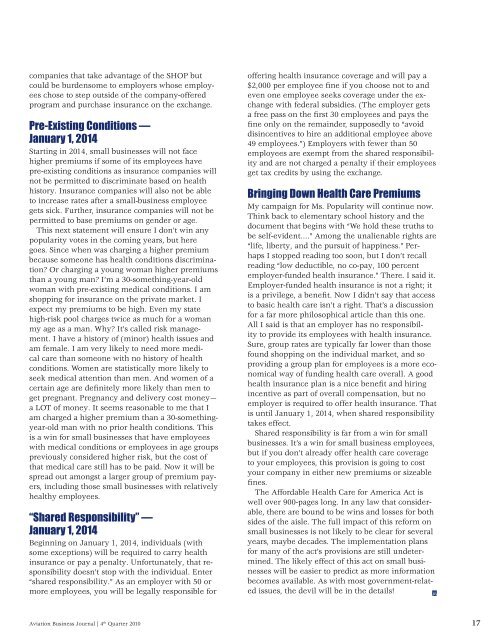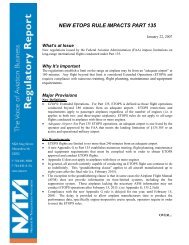You also want an ePaper? Increase the reach of your titles
YUMPU automatically turns print PDFs into web optimized ePapers that Google loves.
companies that take advantage of the SHOP but<br />
could be burdensome to employers whose employees<br />
chose to step outside of the company-offered<br />
program and purchase insurance on the exchange.<br />
Pre-Existing Conditions —<br />
January 1, 2014<br />
Starting in 2014, small businesses will not face<br />
higher premiums if some of its employees have<br />
pre-existing conditions as insurance companies will<br />
not be permitted to discriminate based on health<br />
history. Insurance companies will also not be able<br />
to increase rates after a small-business employee<br />
gets sick. Further, insurance companies will not be<br />
permitted to base premiums on gender or age.<br />
This next statement will ensure I don’t win any<br />
popularity votes in the coming years, but here<br />
goes. Since when was charging a higher premium<br />
because someone has health conditions discrimination?<br />
Or charging a young woman higher premiums<br />
than a young man? I’m a 30-something-year-old<br />
woman with pre-existing medical conditions. I am<br />
shopping for insurance on the private market. I<br />
expect my premiums to be high. Even my state<br />
high-risk pool charges twice as much for a woman<br />
my age as a man. Why? It’s called risk management.<br />
I have a history of (minor) health issues and<br />
am female. I am very likely to need more medical<br />
care than someone with no history of health<br />
conditions. Women are statistically more likely to<br />
seek medical attention than men. And women of a<br />
certain age are definitely more likely than men to<br />
get pregnant. Pregnancy and delivery cost money—<br />
a LOT of money. It seems reasonable to me that I<br />
am charged a higher premium than a 30-somethingyear-old<br />
man with no prior health conditions. This<br />
is a win for small businesses that have employees<br />
with medical conditions or employees in age groups<br />
previously considered higher risk, but the cost of<br />
that medical care still has to be paid. Now it will be<br />
spread out amongst a larger group of premium payers,<br />
including those small businesses with relatively<br />
healthy employees.<br />
“Shared Responsibility” —<br />
January 1, 2014<br />
Beginning on January 1, 2014, individuals (with<br />
some exceptions) will be required to carry health<br />
insurance or pay a penalty. Unfortunately, that responsibility<br />
doesn’t stop with the individual. Enter<br />
“shared responsibility.” As an employer with 50 or<br />
more employees, you will be legally responsible for<br />
Aviation Business Journal | 4 th Quarter 2010<br />
offering health insurance coverage and will pay a<br />
$2,000 per employee fine if you choose not to and<br />
even one employee seeks coverage under the exchange<br />
with federal subsidies. (The employer gets<br />
a free pass on the first 30 employees and pays the<br />
fine only on the remainder, supposedly to “avoid<br />
disincentives to hire an additional employee above<br />
49 employees.”) Employers with fewer than 50<br />
employees are exempt from the shared responsibility<br />
and are not charged a penalty if their employees<br />
get tax credits by using the exchange.<br />
Bringing Down Health Care Premiums<br />
My campaign for Ms. Popularity will continue now.<br />
Think back to elementary school history and the<br />
document that begins with “We hold these truths to<br />
be self-evident....” Among the unalienable rights are<br />
“life, liberty, and the pursuit of happiness.” Perhaps<br />
I stopped reading too soon, but I don’t recall<br />
reading “low deductible, no co-pay, 100 percent<br />
employer-funded health insurance.” There. I said it.<br />
Employer-funded health insurance is not a right; it<br />
is a privilege, a benefit. Now I didn’t say that access<br />
to basic health care isn’t a right. That’s a discussion<br />
for a far more philosophical article than this one.<br />
All I said is that an employer has no responsibility<br />
to provide its employees with health insurance.<br />
Sure, group rates are typically far lower than those<br />
found shopping on the individual market, and so<br />
providing a group plan for employees is a more economical<br />
way of funding health care overall. A good<br />
health insurance plan is a nice benefit and hiring<br />
incentive as part of overall compensation, but no<br />
employer is required to offer health insurance. That<br />
is until January 1, 2014, when shared responsibility<br />
takes effect.<br />
Shared responsibility is far from a win for small<br />
businesses. It’s a win for small business employees,<br />
but if you don’t already offer health care coverage<br />
to your employees, this provision is going to cost<br />
your company in either new premiums or sizeable<br />
fines.<br />
The Affordable Health Care for America Act is<br />
well over 900-pages long. In any law that considerable,<br />
there are bound to be wins and losses for both<br />
sides of the aisle. The full impact of this reform on<br />
small businesses is not likely to be clear for several<br />
years, maybe decades. The implementation plans<br />
for many of the act’s provisions are still undetermined.<br />
The likely effect of this act on small businesses<br />
will be easier to predict as more information<br />
becomes available. As with most government-related<br />
issues, the devil will be in the details!<br />
17
















